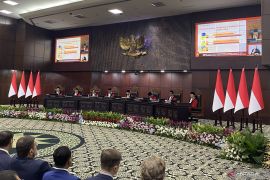The attack on the residents of Sei Ijum Raya village might have been triggered by a latent revenge, said Muhammad Jainuri, resident of Sei Ijum Raya village.
"Following the attack, a communal clash involving Sei Ijum Raya and Parebok villagers nearly broke out," he said.
Subehan and Sarifudin were attacked by two Parebok villagers named Mursidi alias Imur, 25, and Asnawi, 45, while having breakfast at a restaurant of the market on Sunday morning, he said.
After stabbing the two ill-fated men, the suspects ran away. The victims` family members got mad and tried to take revenge against the suspects` relatives in Parebok village, he said.
Luckily local policemen could prevent a communal clash after successfully stopping tens of Sei Ijum Raya villagers from approaching enemies from Parebok village.
Chief of Kotawaringin Timur district`s police Adjunct Senior Commissioner Abdul Hasyim said his men had successfully assisted the two villagers to find a peaceful solution to the incident.
"We have helped them resolve their problem peacefully and ask them to restrain themselves and avoid violence," he said.
In anticipating any unwanted eventuality, tens of policemen had been deployed to the two villages, he said, adding that the Sunday incident was purely a crime.
The incident had nothing to do with sectarian conflict. The attackers of Subehan and Sarifudin remained fugitives, he said.
Various parts of Indonesia remain vulnerable to communal and sectarian conflicts partly due to growing intolerance and poverty.
The latest incidents of sectarian violence are an attack on Ahmadiyah followers in Umbulan village, Pandeglang district, Banten province, on February 6, and an unrest in Temanggung district, Central Java, on February 8.
In the Pandeglang attack, three Ahmadiyah followers including Mirza Ghulam Ahmad, the founder of the sect in 1889 as a prophet after Muhammad (peace be upon him), were killed.
In the Temanggung incident, at least two churches and a Catholic school as well as a number of vehicles were destroyed.
The Temanggung incident was believed by the Central Java provincial police to have been provoked by misleading information disseminated to the public through short message service (SMS) saying that the defendant in a religious blasphemy case, Antonius Richmond Bawengan, 50, had received a too light jail term by the Tamanggung district court.(*)
Editor: Aditia Maruli Radja
Copyright © ANTARA 2011











